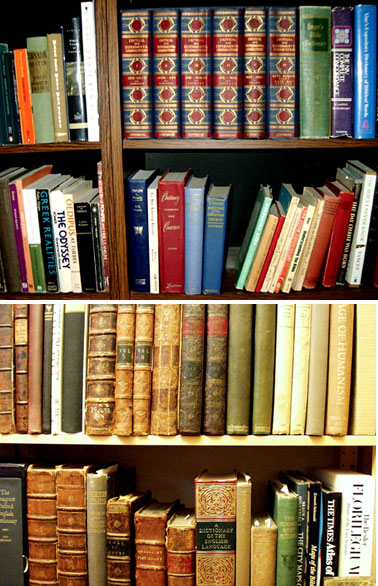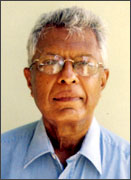|
Attn: those who are seeking greener pastures:
No grass is greener than the grass at home
By Aditha Dissanayake
[email protected]
|

Raw material - literature
|
|

Prof. D. C. R. A. Goonetilleke
|
What makes a professor a professor? Or, to put it in another way how
does one go about becoming a professor of literature - and not just any
professor, but a legend? The doyen of English studies in Sri Lanka? And
above all a mentor for an uncountable number of undergraduates spanning
over four decades?
You might as well ask, how does one become a flawless human being -
whatever that might mean? Could it be that, one falls in love at an
early age - with books?” The student asks herself as she sits, for the
first time since she got to know him, in the study of her professor’s
home.
Knowing perhaps that this would be the last time (for sometime), that
she would be paying a visit, he had asked her to step into the study
where an uncountable number of books stare at her, among them no less
than twenty with the name D. C. R. A. Goonetilleke written on the spine.
The answer to her question comes when she asks the professor to describe
his childhood and school days.
“I love reading. I love books. My favourite subjects at school were
English Literature and Latin. I attended the Royal Primary School and we
had to pass a test to enter Royal College which was not much of a
hurdle”. This was in 1950 and he recalls how for four years everything
had been blissfully “uneventful”.
In 1954, however, he was shocked to learn that his father was
suffering from cancer. Recalls Prof. Goonetilleke. He remembers how he
had gone to collect his prizes at the College Prize giving in December
1955, straight from his father’s bedside in hospital.
“My father died in April 1956 at 54 years of age, the year I was to
sit for the University Entrance Examination (now the GCE A/Level). I was
the eldest of a family of 5 children and my mother was a home maker. In
case I forgot my responsibilities, one of my uncles wrote me a letter,
pointing out that I was “in loco parentis” (in the place of a parent).
What was it like growing up in the late 1940s? Professor Goonetilleke
feels his generation was lucky. “We were living at a time when there was
peace in the country. There were no problems such as could create
pressures on our minds”.
Tuition classes were almost non-existent. Homework was not onerous.
Schools had both morning and afternoon sessions and the evenings were
devoted to play, which obviously had no adverse effects. Getting the top
prize, the Governor General’s Prize for Western Classics and having his
name inscribed on a panel in the College Hall were not problems to lose
sleep over.
He recalls his days as an undergraduate at the University of Ceylon,
Peradeniya, (which was the only university around, at that time) as a
period which was most enjoyable and highly educative.
To him, the University of Peradeniya is “one of the most beautiful
campuses in the world”, and he feels he was lucky to have been there
residing at Marrs Hall, situated at the top of a hill with a panoramic
view, during its golden years. Going to see Prof. Sarachchandra’s plays
in the open air theatre had been a favourite past time.
Watching Maname and Sinhabahu, however was not the most attractive
leisure activity. Playing badminton was.
“My marriage to my wife Chinchi (her pet name; real name Chitranganie)
is the result of a campus romance. We were partners in the Mixed Doubles
section of the Peradeniya Open Badminton Tournament in 1960”. Says
Professor Goonetilleke. Having discovered they were kindred spirits on
the badminton courts they had “quickly decided to continue as partners
for life”.
Unlike many others who had fumbled with one profession or another
till they discovered their true vocation, Prof. Goonetilleke says from
the very first day he started to teach as an assistant lecturer he knew
this was what he wanted to be throughout his life.
“I felt that the profession of being a university teacher suited my
temperament. I was appointed to such a position even before the results
of the Final Examination were out, and so I never thought of an
alternative profession. My enjoyment of teaching was complemented by my
dedication to scholarship. My success as a scholar, probably, confirmed
me in the profession”.
His books such as Developing Countries in British Fiction, Images of
the Raj, Joseph Conrad: Beyond Culture and Background, Salman Rushdie
and Joseph Conrad’s Heart of Darkness, and numerous articles in
prestigious journals earned for him a position as a well-established
critic of 20th century and postcolonial literature on the international
level.
Remember how Picasso said “painting is my hobby. When I have finished
painting, I paint again for relaxation”? Prof. Goonetilleke seems to do
the same.
He says he makes no distinction between work and relaxation because
he finds his work enjoyable. “After all, my raw material is literature
and my approach is through reading. Making discoveries is exciting and
seeing one’s work in print has a pleasure all its own”.But he does love
to listen to music, usually English/Sinhala oldies, and sometimes modern
songs as well.
Answering the question, on why he has never written fiction even
though he has encouraged other writers through his numerous anthologies
he says: “I used to write short stories as an undergraduate and had one
published in the Daily News. I also jotted down plots for several more.
But after graduation, I felt I could not make the grade internationally
as a creative writer. I succeeded as a scholar on this level and there
was no turning back”.
He will surely become the envy of all writers who suffer from
writer’s block, when they hear him say he does not even know what it’s
like to have this ailment, peculiar only to scribes and for which a cure
is yet to be found. He has never experienced it but admits “sometimes I
take a little time to get started”. Ideas which are in a kind of a big
soup gradually begin to fall into place after a start is made.
Never the one to get up early or break rest - to write, he says he
does his scholarly work “as and when possible - morning, afternoon or
evening - and not according to a timetable”.
Having visited many countries during the past decades he finds it
difficult to decide which country he prefers the most. “I have spent
most time in Britain because of my subject and then Germany. Both
countries are ideal for research and teaching. (Cambridge particularly
is a fantastic place.
The election to a stipendiary Fellowship there - which I was
fortunate to receive - is an aspiration common to academics in English
studies all over the world.) Both countries have much to offer by way of
scenic beauty and cultural riches.
The cultural wealth of India is no less. Australia and New Zealand
offer attractive scenery, fauna and flora, and aboriginal artefacts
among other items of interest. Singapore, Hong Kong and Kuala Lumpur are
interesting as cities.
“The game parks of Zimbabwe are a revelation. Victoria Falls is
unforgettable. Jamaica has its own unique culture. There are also other
places of interest which have widened my horizons”.
Yet, no other land holds his heart in her grips as does his
motherland.
Though he could have easily decamped to a lucrative job in a
developed country, he had remained in Sri Lanka because of his love for
the pearl shaped island in the Indian ocean.
“I have remained in Sri Lanka because I wished to serve my country
and because I felt that I could not be happy elsewhere as I am here,
whatever the setbacks, difficulties and risks. My work on Sri Lankan
literature is the consequence of my love for the island”.
Nothing had been more pleasing than to have Vijitha Yapa publish his
books, Sri Lankan English Literature and the Sri Lankan People 1917-2003
and Kaleidoscope: An Anthology of Sri Lankan English Literature, which
are surely the greatest contributions a scholar has made in the arena of
Sri Lankan English literature till now.
Turning down highly remunerative offers of employment since he
retired in September 2004, he says, today, he has devoted himself wholly
to reading and writing. Having published three books in the past four
years, he is now working on another, for a famous British publisher.
What are his plans for the future? “I do not have long-term plans”.
Says Prof. Goonetilleke proving that, sometimes the most complex
questions have the simplest answers.
This is it. The student closes her notebook feeling she had come to
the end of the most insightful and influential lecture she had yet had
with her professor.
The subjects of the lesson? Courage, perseverance, and contentment.
The student? You know her. |
